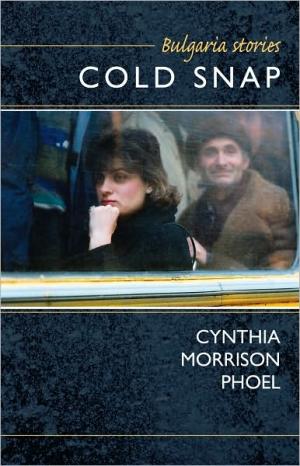Cold Snap: Bulgaria Stories

There is hardly anything more satisfying to read than well-crafted short stories. Cynthia Morrison Phoel’s debut collection of tales from Bulgaria intertwines the stories of several families living in fictional Old Mountain, many sharing a concrete post-Communist apartment building, neighbors in crumbling plaster houses; and often, surviving similar struggles in their attempts to find love and meaning in life and to escape the poverty they have always known.
In Cold Snap, we meet unhappy couples who argue, then don’t speak because there’s nowhere to go, no way to leave the other person and the tiny space they have carved out together. An underemployed husband spends his summer earnings on a satellite dish; soon, his friends have filled the apartment, pushing out any space for reconciliation with his migraine suffering wife. Their son begins to fail his English class, where his teacher gives lessons on contextual words like heartbreak, forsaken, hanky, and drunk—words that feel funny to learn and nevertheless described abysmal realities and people at whom you should not laugh.
The beauty of these narratives is that they’re told across stories, in nonlinear ways. A young mathematician graduates and faces an uninspiring future. One woman compulsively knits extraordinarily beautiful sweaters, the kind that her friends joke could only be worn on shows like Dallas. Upon completion, she abandons them by the dozen in her cellar. The only woman who has made it out comes home for a visit, but leaves again for Japan before she is ensnared by her old life. The community dentist is busiest in cold months—the only time she is truly swamped—when the townspeople flock to the only place where they can sit in a well-heated room for several hours at a time. In the final story, after which the book is named, every character makes one final appearance as the entire village waits for the central heat to come on in the dead of winter with one powerful yet simple flick of a switch.
Phoel worked as a Peace Corps volunteer in Bulgaria, and it shows. She writes the way only a cultural insider can, with compassion and humor and insight into the lives of her characters and their unique struggles. Yet her forced distance is the best part of her work. Through her, we peer into the lives of others without ever fully inhabiting them. The balance is perfect.
Reading about the street dog affectionately called “Cucumber” because of his protruding rib cage—who shows up in every one of the book’s stories—I cried so hard one evening that I woke my sleeping partner. For a long time, we were both unable to sleep. Even the less overtly sad of these bleakly charming stories kept me up at night, entranced, and haunted me still weeks later. If only everyone could translate the experiences from their time abroad into such compelling fiction.